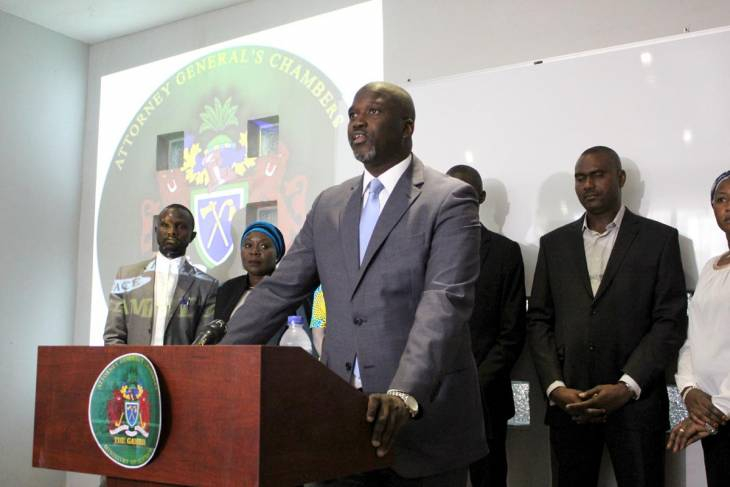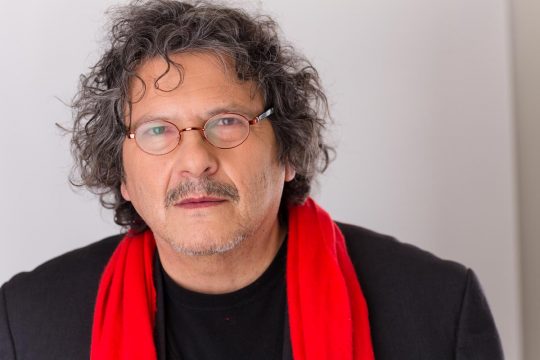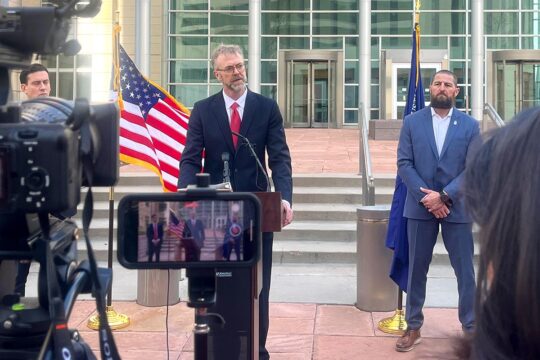At the beginning of every week, the same scene plays out at the High Court in Banjul. At midday, a bus drops a group of accused persons and their security guards at the foot of a blindfolded statue bearing a pair of scales and representing justice. These men have come for hearings in the trial of the National Intelligence Agency (NIA), the former intelligence service. They have been coming to court for a year and a half and being questioned on the murder in custody of political opponent Solo Sandeng, who was arrested in April 2016 during a demonstration. They have all pleaded not-guilty before Judge Kumba Sillah-Camara in his white wig, inherited from British court traditions. Since mid-October there are only eight of them after Louis Gomez, former NIA number 2, died following a brief spell in hospital. The causes of his death are not yet known.
The NIA trial is the only criminal trial linked to the former regime’s crimes that is currently taking place in Gambia. Jammeh’s intelligence service was known for arbitrary detentions and many cases of torture in its jails. This group of former NIA leaders was arrested hurriedly a few weeks after former president Jammeh went into exile in January 2017, at a time when the judicial system was struggling to recover from 22 years of dictatorship. The trial has been marred by bungling and postponements.
Justice system not ready
The remains of Solo Sandeng, exhumed in April 2017, are still at the morgue pending the results of a police forensic analysis. According to a film broadcast on November 1 by international organization Justice Rapid Response, which sent a team of forensic experts, the identity has been confirmed. The victim’s son Muhammed Sandeng was angry at the slowness of initial procedures, but now knows he must be patient. “I am now aware that these processes take a lot of time,” he says. “We are moving in the right direction. But it is difficult not to be able to reclaim the body. And if the government could speed things up, so that we know who was responsible and what is their punishment, it would help us to turn the page.”
It seems this trial is still very hard for the Justice Ministry to manage. Justice Minister Abubacarr Tambadou has already admitted several times that his teams were not ready for a trial on this scale. For the moment, therefore, it is out of the question to open new cases.
What should we do with this group of men who have all admitted committing terrible crimes, when the justice system is not ready in terms of staff and structures?
There are nevertheless other suspects in detention. According to the army, there are six “Junglers” (Yahya Jammeh’s death squad) in military prisons. “We recognize that they have been in detention for a long time without being brought before a judge,” said the Justice Minister at a press conference on October 9, recognizing also that this violates the Gambian constitution. “But what should we do with this group of men who have all admitted committing terrible crimes, when the justice system is not ready in terms of staff and structures?”
International trials in view?
The NIA trial thus remains the only one in the country, but victims of the dictatorship can also place their hopes in another case pending outside Gambia. Since January 2017, Switzerland has been keeping in detention former Gambian Interior Minister Ousman Sonko, who went into exile after the former president was removed from power. His presence in Switzerland was signalled by Trial International, a Swiss NGO which assists victims of international crimes. “Ousman Sonko held top positions for 15 years. He is a pure product of the Jammeh school, and appears to have been implicated in several very serious incidents,” says Bénédict de Moerloose, head of the Investigations and Criminal Law Division at Trial International. “So with him we are very close to the top. He was probably one of the main executors. It is important that those most responsible be tried, and to show that it is possible.”
Jammeh’s former minister is under examination by a Swiss prosecutor for suspected crimes against humanity. “Investigations are continuing, witnesses are being called to shed light on the facts, and we hope that the case will be sent for trial in eight months to a year,” explains De Moerloose.
The third prong of efforts to get criminal trials concerns Yahya Jammeh himself. The Jammeh2Justice campaign, launched a year ago by victims’ associations with the support of international NGOs aims to collect evidence against the former president. It is working primarily on a massacre of mainly Ghanaian migrants perpetrated in 2005. The hope is that one day the judicial authorities of Ghana or another country will take up the case and launch proceedings against the former dictator, who is now in exile in Equatorial Guinea.







